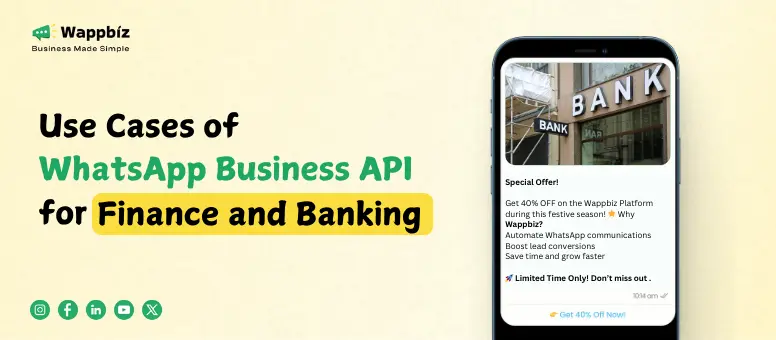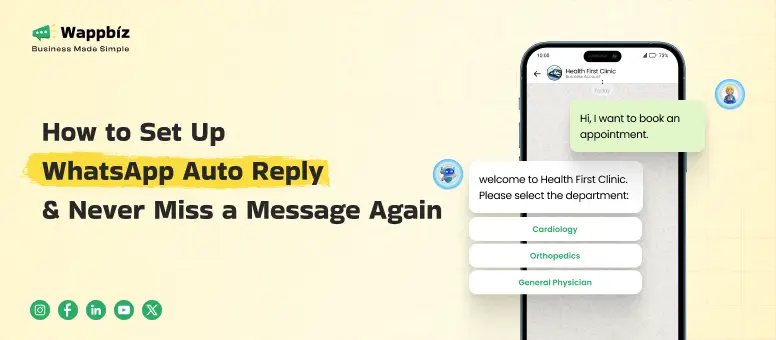Have you ever experienced prolonged waiting for a loan status or overlooked a crucial update from the bank? Instant customer communication has become an indispensable aspect of the finance world. Enter into the WhatsApp Business API to ease and secure these communication gaps, enabling real-time support by banks and financial institutions. Whether it’s a fraud alert or transaction details, WhatsApp guarantees contactability, while Wappbiz’s API solutions keep your customers informed and engaged. Imagine a scenario where you can access your balance, reminders, and alerts through a message. This enters you into the new age of finance, which will rapidly change your banking experiences.
Why the WhatsApp business API is important for finance and banking
Nevertheless, the finance and banking sector manages sensitive information, necessitating reliable communication channels that customers can trust. The WhatsApp Business API provides a balance of security, convenience, and the global reach necessary for effective communication in our connected world. Financial institutions can make automated notifications, provide immediate support, reduce response time, and comply with Wappbiz and other WhatsApp solutions. It is more than just communication, it is an integrated API that prepares banks to provide frictionless service experiences, enhance existing loyalty, and drive efficiencies. Here are 20 of the most effective WhatsApp Business API use cases in finance and banking.

Top 20 Use Cases of WhatsApp Business API for Finance and Banking
1. Real-Time Transaction Alerts
Banks can use the WhatsApp API to notify customers of any transactions they have likely performed, providing real-time notifications and ensuring account activity is always available.
For example, when a customer makes a payment or deposit, the system instantly sends them a message detailing the amount and balance. Such transparency reassures the customer that they are not dealing with unwanted financial activities and can spot any unauthorized transaction instantly, thus reducing the chances of fraud. Real-time alerts empower customers and earn their trust, enabling them to maintain control over their accounts without the need to log into three different apps every couple of hours.
2. Fraud detection and alerts
Thanks to the WhatsApp Business API, banks are now able to send alerts on suspicious activity in real time which prevents from compromising bank accounts and maintain safety.
For example, if someone does a high-value purchase from an international country, the system automatically triggers an alert through your WhatsApp. It allows customers to authenticate if the transaction is valid or directly block the cards. This prompt response prevents unauthorized access and provides customers with peace of mind. Banks tend to get more proactive if they use WhatsApp for fraud alerting with clients feeling that their security is a priority.
3. Account Balance Inquiries
With our WhatsApp Chatbot integration, customers can immediately find their account balance which is time consuming factor for daily update message. By just pinging “Check Balance,” customers get an immediate response with their balance status. This self-service feature saves time as well as avoids the need to visit a branch or contact customer service.
For example, a customer who has plans for a big spend can verify their balance in seconds and make decisions more confidently. Such accessibility to financial familiarity provides customers with convenience and a smooth banking experience, where the bank is striving for straightforward availability as well as user-friendly options.
4. Loan Application Status
With WhatsApp automation, the banks will be able to notify their customers at every step of the loan application process which is time saving process to make loan approval more convenient.
For example, upon submitting a loan application, customers will receive notifications regarding its review, approval, or the need for additional documents. If clients need to track the status of their loans, they can do so without having to make follow-up calls, all via WhatsApp. When customers are clear about what to upload next, then they have less anxiety and clearer information, which leads them to a more seamless loan process. There are also fewer customers calling customer service to ask about their loan status, which makes servicing less resource-intensive overall.
5. Appointment scheduling
Banks can also send appointments and reminders through the WhatsApp API like Wappbiz, and ensure they get in touch with bank in preferred timing without any complexity.
For example, a financial advisor books an appointment with the client, who then receives a WhatsApp message confirming the date and time along with reschedule options. That helps reduce the number of no-shows and ensures customers are ready. Banks may also recommend scheduling appointments a few days in advance to enhance attendance. It not only saves time for both parties, but it also makes for a more professional and neat experience.
6. Document Submission Reminders
Businesses using a WhatsApp Business API can send their customers reminders to submit critical documents in a preferred time.
For example, if a customer wants to apply for a loan, he will be required to produce supporting documents like his income or identity. The bank then notifies the customer via WhatsApp that they must submit these documents to avoid any delays. With automated reminders, the process keeps flowing without administrative back-and-forth. This method assures that clients know the specifics of what is necessary; this conserves time, and the Android process uses up even more financial institution applications.
7. Customer Feedback Collection
Banks can use WhatsApp marketing to send survey requests to large audiences, enabling them to gather feedback on a larger scale and more easily.
For example, a customer receives a WhatsApp message asking for a rating of the transaction. A quick link to a brief questionnaire provides the bank with the necessary feedback on service quality. Customers know data is valuable because it can help banks improve their services. This approach helps customers feel less like a commodity and more like their individual criteria are valuable in improving a service. Short customer feedback requests stimulate more responses, resulting in a higher level of consumer satisfaction.
8. Financial Education Tips
Banks can send out relevant financial advice through WhatsApp automation to their customers as well.
For example, the bank could send weekly WhatsApp budgeting tips or a savings suggestion. It gives customers a clear understanding of their expenses, enabling them to manage their finances more effectively, and establishes the bank as a reliable financial advisory partner. Advice on things such as setting monthly saving goals can improve your clients decision-making skills. By providing educational content, you foster customer loyalty by demonstrating the bank’s concern for their financial achievements, which extends beyond banking services.
9. Investment Portfolio Updates
Via the WhatsApp API, banks are able to update customers in real time about their respective investment portfolios.
For example, when the client portfolio’s stock price fluctuates, the system sends an alert message to the customer via WhatsApp. Providing instant updates gives customers the ability to quickly respond to their investments, instilling trust in all that your bank has to offer. WhatsApp investment updates allow customers to stay invested and earn the most in terms of money.
10. Notifying about EMI and Loan Repayment
A bank can also use the WhatsApp Business API to send automated reminders for EMI or loan payments.
For example, the bank sends a WhatsApp message to the customer five days prior to an EMI due date, which includes the payment amount and deadline. It assists the customer in preventing late payment and always having excellent credit. For banks, timely reminders equal fewer missed payments and a smoother cash flow. These reminders not only enable customers to conveniently pay their dues but also demonstrate the bank’s concern by sending another reminder for payment at the same time.
11. Secure Document Sharing
Banks can easily share documents via WhatsApp Chatbot features, which are secure in nature for user verification.
For example, the customer uploads ID proof and necessary documents through a secure WhatsApp chat while applying for a loan. This is a convenient and safe way of exchanging sensitive documents securely. Clients are pleased not to have to bother going into a branch just to submit a few documents, while banks benefit from the increased efficiency and compliance with privacy standards without sacrificing quality of service.
12. Branch Locator Assistance
Banks are able to assist their customers in locating the nearest branch or ATM through the WhatsApp API.
For example, customers need to send in their location, and the chatbot will reply with the nearest branch or ATM, including a map and route. Traveling or disabled clients can benefit from this feature, which is worth it. Making it convenient Finding branches or ATMs quickly saves a lot of time for the customers. Easy and convenient service by the bank reflects on customer friendliness and availability.
13. Credit card limit notifications
Banks can implement this via the WhatsApp API, alerting customers when they approach their credit card limit or detect suspicious transactions.
For example, the system notifies a customer when their credit limit reaches 90%. It reminds them to control their spending and avoid over-limit fees. By notifying clients of possible unusual activity, they curtail potential fraudulent activity and build trust in their processes. This aspect indicates the hands-on approach of the bank when it comes to enabling its customers to stay on top of their finances.
14. Exchange Rate Alerts in Real Time
Banks can use the WhatsApp API to send real-time notifications on exchange rates.
For example, the WhatsApp API sends alerts to clients who frequently transfer money internationally when rates are high. This is particularly beneficial for businesses and travelers who need to exchange currencies quickly. Just over 2,800 clients are getting updates on WhatsApp so that they can act upon currency trades when it matters most to their finances. Providing such timely information can help make the relationship stickier between a bank and its client base.
15. Tailored recommendations for financial products
WhatsApp marketing can get products advised by banks and customized around consumer profiles.
For examples, a bank may advise a client with significant capital to invest in a high-interest savings plan. By doing this, banks are able to communicate their understanding of the individual needs of customers and therefore build a stronger relationship. These special offers also boost engagement and increase customer retention, with clients gaining confidence in the financial growth their bank wants for them.
16. One-time passwords and two-factor authentication
For OTP verification, banks are able to send OTPs via the WhatsApp API which makes more secure from compromising account.
For example, when a customer makes an online transaction, the customer receives a one-time password (OTP) on WhatsApp for verification purposes. Implementing this secure method of authentication prevents unauthorized access and protects clients’ accounts. OTP via WhatsApp is simple for users, and it comforts them that their account is safe.
17. Insurance policy renewal reminders
Insurance providers can use WhatsApp automation to send renewal reminders to their customers.
For example, customers get a reminder one week prior to their policy expiry that they need to take care of coverage renewal in time. Such reminders not only minimize policy error, but they also prompt customers to stay protected, which fosters assurance. Banks increase their customer loyalty and retention when they proactively remind clients about policy renewals.
18. New Product Announcements
Banks can use WhatsApp marketing to promote new financial products with description and features in detail.
For example, upon the launch of a new credit card, banks can disseminate information about it via WhatsApp, detailing its features and the application process. This approach ensures that customers remain aware of services that can benefit them, leading to an increase in interaction. The announcements through WhatsApp are more direct to the customer, and it reaches out to them sooner than any other network, thus making way for new offer campaigns.
19. Notifications related to tax filing
During tax season, banks can use WhatsApp BusinessAPI to send timely tax filing reminders to update the customers.
For example, the WhatsApp Business API sends messages to clients about tax-filing deadlines, potential tax-saving opportunities, and reminders to submit necessary documents. This advice alleviates clients’ tax-season anxiety and demonstrates the bank’s commitment to helping them meet their financial obligations. It also helps the bank to position itself as a financial partner for the clients.
20. Real-Time Customer Support
In the case of WhatsApp Chatbot integration, banks can answer basic customer queries 24 × 7. Without waiting, customers can pose questions regarding the balances, transactions, & branch hours.
For example, if a customer queries for their balance, the bot responds instantly. This 24/7 support instantly elevates the level of customer satisfaction while relieving some pressure from call centers and thus providing a frictionless banking experience.
Conclusion
The WhatsApp Business API has revolutionized the finance and banking industry. Banks and financial institutions can use Wappbiz alongside other WhatsApp solutions, allowing them to automate interactions with customers, secure communications between banks and customers, as well as foster enduring connections. The above mentioned use cases illustrate how WhatsApp automation and chatbots aid customer engagement, business operations management, and the delivery of pertinent information to customers. Embracing these technologies will not only fulfill the demands of today’s customers, but it will also help financial institutions stay one step ahead in the industry.
Wappbiz’s seamless integration allows real-time messaging in your financial services with ease. See how easy it is to contact and change customers’.

FAQs
What is the role of the WhatsApp Business API in finance and banking?
WhatsApp Business API allows companies to engage with customers directly by providing secure news updates and transaction alerts, plus one-on-one messaging support.
Will the WhatsApp Business API help banks re-engage with customers?
Absolutely! With WhatsApp, banks can send personalized offers, account activity updates, and real-time help, keeping customers engaged and informed.
How would the WhatsApp Business API help in delivering secure and reliable banking notifications?
Banks can communicate with clients on their transactions, account status, and payment reminders through encrypted transactional alerts via WhatsApp.
Is the WhatsApp Business API affordable for the banking sector?
Yes, WhatsApp is an affordable tool that banks can use to provide instant solutions, lessen the burden on call centers, and keep customers updated.
Can the WhatsApp Business API help with loan application status?
Definitely! Financial institutions can leverage WhatsApp to keep clients updated about loan status, required documents, and approval updates.
How safe is WhatsApp Business API for financial transactions and customer data?
The WhatsApp Business API offers comprehensive end-to-end encryption, guaranteeing the protection and privacy of all client interactions and sensitive information.
What does the WhatsApp Business API do with regard to client retention in banking?
Certainly, WhatsApp is an opportunity for banks to strengthen client relations by sending them personalized offers, account updates, and support reminders.
How does the WhatsApp Business API facilitate feedback collection for financial services?
Banks and financial institutions could also take feedback on their services directly from WhatsApp, boosting customer satisfaction and service quality.
Is WhatsApp suitable for marketing new financial products?
Absolutely! They can also share information on new investment options, loan products, and exclusive deals to keep clients engaged with their respective banks.
Can the WhatsApp Business API enhance company communication concerning fraud detection?
Banks can alert clients to suspicious activity, verify transactions, and maintain account security via WhatsApp instantaneously.







